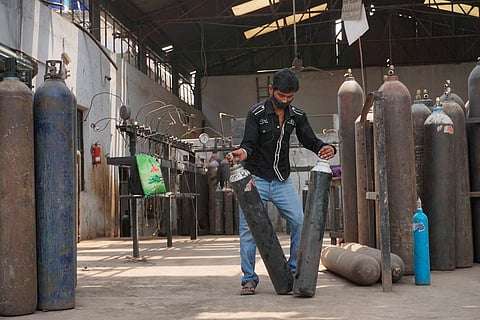

“We tried putting my mother on oxygen at home or in hospitals around my home. But we gave up very quickly as there was no chance of finding a spare cylinder. The only way is to find somebody who is willing to sell it to you on the black market,” said Kolisetty Venkateswara Rao, a resident of Syamala Nagar in Andhra Pradesh’s Guntur.
Similar is the experience of many caregivers of COVID-19 patients who are receiving care at home in the city. The situation has arisen due to an increased demand for oxygen and the lack of sufficient cylinders with refilling plants.
Since the second wave of the coronavirus pandemic hit, the country as a whole has been struggling with inadequate oxygen supply along with shortage of hospital beds and medicines. According to a statement from the Commerce & Industry Ministry issued on May 10, oxygen availability has since been “enhanced by increase in Production Capacity and production, setting up of Pressure Swing Adsorption (PSA) Plants, import of Liquid Medical oxygen (LMO) from Overseas, and Procurement of oxygen Concentrators.”
But for patients who are being taken care of at home due to various reasons, including exorbitant hospital fees, the situation hasn’t improved.
Venkateswara Rao’s family finally bought a five-litre oxygen concentrator to take care of his mother’s oxygen needs.
However, procuring oxygen concentrators has also become extremely difficult. Not only are sellers quoting excessive prices, but even for those who are willing to pay there are only pre-booking orders being taken by most sellers, according to volunteers trying to procure resources for COVID-19 patients. In most cases, the waiting period extends up to two weeks or more.
The availability of oxygen in the open market gradually decreased as the Guntur district administration roped in all oxygen refilling plants and their cylinders to ensure uninterrupted supply of oxygen to hospitals.
On April 25, Chitipothu Gopala Krishna, a resident of AT Agraharam in the city, had managed to source four oxygen cylinders for his uncle when the hospital was about to run out of supply.
“We got hold of one cylinder with the help of an auto driver who was transporting oxygen to hospitals in Tenali (30 km from Guntur). The other three we got from a gas agency. Even though we scrambled and arranged the cylinders in a couple of hours, we couldn’t help my uncle,” Gopala Krishna said.
“When we were looking for oxygen, there was a chance that people like auto drivers could divert a couple of cylinders like I said, but now hospitals are being extra careful. They are making sure they are getting every cylinder they have ordered without delay,” he added.
Oxygen refilling stations too are out of cylinders to stock oxygen. They say they haven’t faced a shortage of liquid oxygen but are facing a shortage of cylinders.
“We are bottling every cylinder that is coming to us. For hospitals we send the refills immediately, while for individuals we take a doctor’s certificate for proof that they are in need of oxygen,” said Harikiran, the supervisor at an oxygen bottling plant in Autonagar on the outskirts of the city.
Harikiran added that people who had taken cylinders are not returning them to the plant. “We can’t blame them. Given the situation outside, they have their own fears and are stocking cylinders for emergencies. But the problem is somebody else who might need it more will suffer,” he said.
Though the refilling plants are charging only Rs 1,000 per cylinder, given the dearth of cylinders they are asking for deposits of anywhere between Rs 5,000 to Rs 30,000.
When asked about the cylinder scarcity, an official at the district oxygen war room, who wished to remain anonymous, said that they are doing their best to make sure that hospitals get enough oxygen.
“As of now, we can confidently say that there is no oxygen scarcity in hospitals. Where required, we take possession of cylinders and provide them to hospitals. For those in home isolation, refilling is available at JOCIL, provided they present a doctor’s prescription and the concerned Village Revenue Officer’s letter,” he said.
But he didn’t have an answer to the question whether the government was doing anything to acquire more cylinders to cater to those in home isolation.
Sujan N is a student of the Asian College of Journalism, currently based in Guntur.